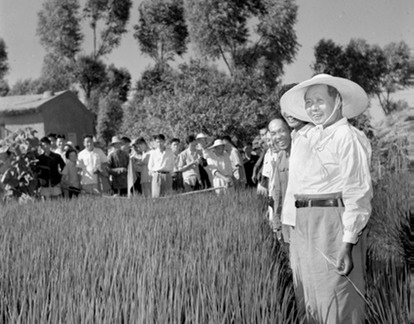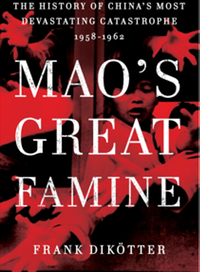The Spectator, 23 September 2010
Systematic Genocide
It is a measure of people’s continuing admiration for Chairman Mao that last year the White House communications director, Anita Dunn, unashamedly described him as a ‘favourite political philosopher’ because, as she told an audience of American high- school graduates, Mao showed that
You don’t have to accept the definition of how to do things, and you don’t have to follow other people’s choices and paths, OK? It is about your choices and your path.
In a brilliant work, backed by painstaking research, Professor Frank Dikötter, has trawled through the Chinese archives to reveal some staggering new details and insights on how Mao bravely ignored everyone’s advice. He launched the forcible massed collectivisation of Chinese peasantry in 1958, a movement dubbed the Great Leap Forward, which in four years killed 45 million people. Mao did this even though his earlier rounds of collectivisation had already killed millions of peasants by seizing their food; and against the advice of Soviet leaders who well remembered how Lenin and Stalin’s collectivisation policies had killed tens of millions.
Prominent famine experts, like Justin Lin Yifu, now the chief economist at the World Bank, have excused Mao, arguing that, unlike Stalin, he wasn’t a monster who did this deliberately or knowingly. Instead, the deaths were the result of mismanagement; peasants should have had the right to leave the communes voluntarily but the plan was basically a great idea. Even the great American sinologist Professor John King Fairbank considered that Mao’s greatest achievement had been to improve the lot of the Chinese peasantry.
Jung Chang, whose family history Wild Swans sold 13 million copies around the world, says that when she wrote the book she did not know the famine’s real cause. She grew up in Sichuan province where some 10 million starved to death and her father was a senior Party official:
It was only during research on Mao: The Unknown Story that I came to realise that the fundamental cause for the tens of millions of deaths was that Mao was seizing food — which he knew his people were dependent on for survival — to export and pay for arms (particularly nuclear) industries.
The archive material gathered by Dikötter, now Professor of Humanities at the University of Hong Kong, confirms that far from being ignorant or misled about the famine, the Chinese leadership were kept informed about it all the time. And he exposes the extent of the violence used against the peasants:
Mass killings are not usually associated with Mao and the Great Leap Forward, and China continues to benefit from a more favourable comparison with Cambodia or the Soviet Union. But as fresh and abundant archival evidence shows, coercion, terror and systematic violence were the foundation of the Great Leap, and between 1958 to 1962, by a rough approximation, some 6 to 8 per cent of those who died were tortured to death or summarily killed — amounting to at least 3 million victims.
Countless others were deliberately deprived of food and starved to death. Many more vanished because they were too old, weak or sick to work — and hence unable to earn their keep. People were killed selectively because they had the wrong class background, because they dragged their feet, because they spoke out or simply because they were not liked, for whatever reason, by the man who wielded the ladle in the canteen.
It was, he says, ‘one of the most deadly mass killings of human history’ but also resulted in the destruction of everything that was within the reach of the party. It was ‘the greatest demolition of real estate in human history — by far outstripping any of the World War II bombing campaigns’.
Dikötter finds evidence that between 30 and 40 per cent of all housing was turned to rubble:
Homes were pulled down to make fertiliser, to build canteens, to relocate villagers, to straighten roads, to make place for a better future beckoning ahead or simply to punish their owners.
This book sheds light on many other aspects of the famine but its great importance is to remind us of why we need to revise our understanding of 20th-century history. If you add up the death tolls from the famines caused by communist leaders in China, the Soviet Union (Lenin and Stalin oversaw three mass famines), Cambodia, North Korea, Ethiopia, and Mozambique, you reach a figure of close to 90 million.You might think all this would merit serious study, but it has taken 50 years for a professional scholar like Dikötter to examine the Chinese famine in a major book.
Take Professor Amartya Sen, awarded a Nobel Prize for his work on famines and development. He chose to study the Bengal famine in 1943, when under British rule up to 3 million died, and the Ethiopian and Sahel famines in the 1960s and 1970s. He then developed the theory that ‘famine is a widespread failure of entitlements’. In other words, famine and poverty are not about governments forcibly seizing peasants’ grain and closing down markets but failing to intervene enough and provide them with their ‘entitlements’.
He later published, together with other scholars, a three-volume work, The Political Economy of Famine, which somehow finds no space to examine Mao’s famines or indeed any of those under other communist governments. Yet in the 1980s, we already knew that over 20 million had died in the Leap and Robert Conquest had published Harvest of Sorrow, the harrowing account of the Soviet famines.
The reluctance to see the link between communism and mass famine, let alone study it, is most peculiar. No one has ever enthusiastically advocated copying the policies of wartime India or Haile Selaisse’s Ethiopia. But Maoism and indeed the collectivisation of third-world peasantry has been promoted around the world by UN agencies and many international aid agencies, and endorsed by a glittering list of intellectuals and politicians from Simone de Beauvoir to François Mitterrand. And while the heyday of Maoism may have passed, it is by no means over. Maoist insurgencies are still tearing apart many countries from Peru to India, Nepal and the Philippines.
Professor Sen, an adviser to the last Labour government and many others on development policies, still believes that ‘China clearly got more from the egalitarian commitment of its authoritarian leadership than India did from its democratic system’ because, he says, the Chinese were more successful in rapidly expanding health care and life expectancy.
The documents that Dikötter has found in Chinese archives also cast doubt on Sen’s most famous thesis: that famines take place where there is no freedom of information. He has said:
The Chinese government itself did not see the need to change its policies partly because it did not have enough information on the extent to which the Great Leap Forward had failed … because of the absence of an uncensored press and other modes of public communication.
Yet the Party compiled no end of statistics and reports and sent hard-hitting reports of the famine to the leadership. The conclusion must be, as Mao’s doctor Li Zhisui observed, that Mao simply didn’t care. For intellectuals like Mao, political theories count for more than corpses. China still doesn’t have a free press, yet for the past 30 years its economy has been doing very well and there has been no more starvation — or talk of egalitarianism.

